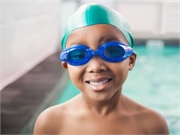Don't Miss
- Could Your Grocery Store Meat Be Causing Recurring UTIs?
- Are You Making This Expensive Thermostat Error This Winter?
- Recognizing the Signs of Hypothyroidism
- 10 Strategies to Overcome Insomnia
- Could Artificial Sweeteners Be Aging the Brain Faster?
- Techniques for Soothing Your Nervous System
- Does the Water in Your House Smell Funny? Here’s Why
- Can a Daily Dose of Apple Cider Vinegar Actually Aid Weight Loss?
- 6 Health Beverages That Can Actually Spike Your Blood Sugar
- Treatment Options for Social Anxiety Disorder
Keep Your Kids Safe in the Water. Here’s How
By LadyLively on July 5, 2020

Trips to the beach or a pool add to summer’s fun, but parents need to ensure that children are safe in and around the water.
Masks and social distancing are a must this year because of the coronavirus pandemic. And kids must be supervised even if they’re able to swim, experts at the Children’s Hospital Los Angeles said.
Two-thirds of drowning deaths occur in the summer — between May and August — and most occur on the weekends.
The hospital offered parents the following swimming safety guidelines:
- Pay attention. Give kids your undivided attention when they’re in or around the water. Small children can drown in as little as one inch of water.
- Take turns supervising. When there are several adults present and children are swimming, designate an adult as the water watcher for a certain amount of time (such as 15 minutes). This can help prevent gaps in supervision and give other parents a chance to read, make phone calls or take a bathroom break.
- Teach your children. Educate your kids about swimming safety. Every child is different, so enroll children in swimming lessons when you feel they’re ready. Whether swimming in a backyard pool or in a lake, teach children to swim with an adult. Even children who are older, more experienced swimmers should swim with a partner every time.
- Learn CPR. It is worth the time and will give you peace of mind if you know what to do in an emergency.
- Discuss the dangers. Teach children to never play or swim near drains or suction outlets, which could cause them to get stuck underwater.
- Invest in life jackets. On boats, around open bodies of water or when doing water sports, kids should always wear a life jacket approved by the U.S. Coast Guard. Make sure the life jacket fits snugly. Have the child raise both arms straight up. If the life jacket hits the child’s chin or ears, it may be too big or the straps may be too loose.
More information
The American Academy of Pediatrics has more on children and summer safety.
Source: HealthDay
Copyright © 2026 HealthDay. All rights reserved.










